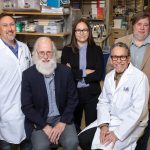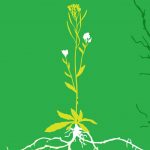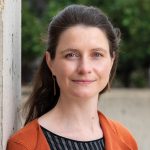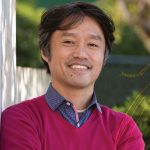A new route for regulating blood sugar levels independent of insulin
The discovery of insulin 100 years ago opened a door that would lead to life and hope for millions of people with diabetes. Since then, insulin, produced in the pancreas, has been considered the primary means of treating conditions characterized by high blood glucose, such as diabetes. Now, Professor Ronald Evans, first author Gencer Sancar and colleagues have discovered a second molecule called FGF1 that is produced in fat tissue and, like insulin, also potently and rapidly regulates blood glucose. Their finding could lead to the development of new diabetes therapies, and also lays the foundation for promising new avenues in metabolism research.
Featured Stories
 The Salk Institute and Lustgarten Foundation form strategic pancreatic cancer research partnershipSupported by a $5 million grant, the partnership aims to identify and validate potential targets for new pancreatic cancer drugs. Four participating labs, led by Salk Professors Reuben Shaw, Ronald Evans, Tony Hunter and Assistant Professor Dannielle Engle, will bring their individual areas of complementary expertise to bear on the collaborative goal.
The Salk Institute and Lustgarten Foundation form strategic pancreatic cancer research partnershipSupported by a $5 million grant, the partnership aims to identify and validate potential targets for new pancreatic cancer drugs. Four participating labs, led by Salk Professors Reuben Shaw, Ronald Evans, Tony Hunter and Assistant Professor Dannielle Engle, will bring their individual areas of complementary expertise to bear on the collaborative goal. The weed that changed the worldHow Arabidopsis thaliana became one of the most important tools in science—and how the information the small weed has revealed over decades of research now enables the development of Salk Ideal PlantsTM, a new generation of food crops that are better equipped to both thrive in a changing climate and help mitigate it.
The weed that changed the worldHow Arabidopsis thaliana became one of the most important tools in science—and how the information the small weed has revealed over decades of research now enables the development of Salk Ideal PlantsTM, a new generation of food crops that are better equipped to both thrive in a changing climate and help mitigate it. Courtney Glavis-Bloom — Shining the spotlight on aging to find a cure for Alzheimer’s diseaseSenior Staff Scientist Courtney Glavis-Bloom’s work is driven by her experience caring for her grandparents, who were diagnosed with Alzheimer’s disease when she was in high school. She saw firsthand how dementia robs individuals of their connections to the world—now she studies the brain areas affected in aging in the hope of finding a cure.
Courtney Glavis-Bloom — Shining the spotlight on aging to find a cure for Alzheimer’s diseaseSenior Staff Scientist Courtney Glavis-Bloom’s work is driven by her experience caring for her grandparents, who were diagnosed with Alzheimer’s disease when she was in high school. She saw firsthand how dementia robs individuals of their connections to the world—now she studies the brain areas affected in aging in the hope of finding a cure. Helen McRae — Leveraging the body’s own immune response for more effective cancer therapiesHelen McRae was a graduate student when her cousin was diagnosed with lung cancer and received immunotherapy—an approach that empowers a patient’s own immune system to destroy tumors. McRae saw the promise of this newer treatment, but also how much more research is needed to help it work for more people.
Helen McRae — Leveraging the body’s own immune response for more effective cancer therapiesHelen McRae was a graduate student when her cousin was diagnosed with lung cancer and received immunotherapy—an approach that empowers a patient’s own immune system to destroy tumors. McRae saw the promise of this newer treatment, but also how much more research is needed to help it work for more people. Kenta Asahina – Flying into the future of technology and innovationOriginally from Japan, Associate Professor Kenta Asahina grew up exploring nearby farmlands with his two brothers in search of insects and plants. Their dad enjoyed taking them to the mountains and national parks. These experiences inspired his interest in the natural world, and Asahina now studies how genetics impact fruit fly behavior.
Kenta Asahina – Flying into the future of technology and innovationOriginally from Japan, Associate Professor Kenta Asahina grew up exploring nearby farmlands with his two brothers in search of insects and plants. Their dad enjoyed taking them to the mountains and national parks. These experiences inspired his interest in the natural world, and Asahina now studies how genetics impact fruit fly behavior.






















































